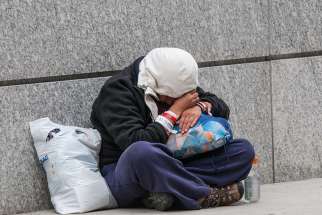Joe Gunn ready for next step in social justice with Oblate Centre
OTTAWA – After 10 years at the helm of Citizens for Public Justice, Joe Gunn, 64, is leaving Feb. 11 to head up the new Oblate Centre at Saint Paul University in Ottawa.
Joe Gunn: Strategy to eradicate Canadian poverty needs an action plan
The world commemorated the United Nations’ International Day for the Eradication of Poverty on Oct. 17, but you could be forgiven for not noticing.
Readers Speak Out: October 14, 2018
Making things right
Re: New abuse guidelines focus on prevention (Oct. 3):
This is a good article, but I was hoping you could write that I genuinely feel that the bishops of Canada are really trying to make things right to protect minors. They seemed very sincere with me after my speech to them about clergy abuse. I sincerely want to give them encouragement and support.
It is a different world than before when people kept things hidden. I don’t think the Church knew how to handle it and handled it very poorly. People want transparency and accountability.
The bishops need the laity to work with them. We cannot undo the damage done, but we can have a positive effect in the present and the future.
We must do everything we can to restore lost trust and faith in God through listening to abuse survivors and educating people about safeguards. If abuse is reported, be supportive.
I believe we have come a long way. We must not lose our hope and faith in God. There is hope. I really believe the bishops are trying to make things right.
Deborah Kloos,
Windsor, Ont.
Questioning celibacy
Almost all the articles in The Register about the current sexual abuse crisis are based on repairing the problems of the past with apologies and compensation. But what about the future?
It is necessary to preserve the Church going forward. All of the goodwill and apologies will not change the future. The underlying cause(s) of the rampant sexual abuse will not disappear because the Pope says it must.
The recruitment of new priests must change. It is imperative that mandatory celibacy be discontinued. A few years ago when a number of Anglican priests left their church over same sex-marriage, these priests were readily accepted into the Catholic Church despite being married. The world didn’t stop turning.
And while we are at it, we must ordain women into the priesthood and be prepared to promote them to bishops and even cardinals. Why not a female pope some day?
Patrick King,
Toronto
Why seek answers?
Re: We need answers (Sept. 9):
Your editorial seems to confirm your conviction that the Viganò/Francis you-said-I-said controversy needs an answer. My question is why? Why do we need answers that will do nothing but deepen the conservative-liberal divide?
What percentage of the 1.2 billion Catholics are really interested in the Viganò/Francis controversy? And what percentage are even aware of it?
Although we must do everything to deracinate the evil that has seeped into the Church, we should be careful that in doing so we do not exacerbate the present divide.
J.E. Sequeira,
Pointe Claire, Que.
An important book
Re: Book’s journey takes some tedious turns (Sept. 16):
Joe Gunn has produced an important work. I disagree with the person reviewing it in The Catholic Register, that it is very exclusive. I do believe that it is an eye-opener for joining the activism necessary to take on some of the major problems of today’s world, and nothing is more important than climate change.
It is an important book for many people who are active or want to be active in the world that Joe Gunn knows so well.
Virginia Edman,
Toronto
Book’s journey takes some tedious turns
Journeys to Justice: Reflections on Canadian Christian Activism by Joe Gunn (Novalis, 176 pages, softcover, $14.95 on amazon.ca)
Poverty reduction and action on climate change major items for 2018
Liberals closing the book on charity political audits
OTTAWA - Church-based charities, including the Canadian Catholic Organization for Development and Peace, are applauding the end of Canada Revenue Agency’s political audit program.
Anti-poverty campaign wants candidates to Chewonthis!
OTTAWA - Lost in the “fight for the middle class” in the federal election campaign is the plight of Canada’s poor, said Joe Gunn of the Citizens for Public Justice.
A voice for justice impossible to silence
OTTAWA - When I was a teen, Bob Carty asked me if I could drive his standard-transmission blue Corolla. “It’s a long way to Mexico,” he said, “and we’ll have to drive hard to get there as fast as the others going down by bus.”
Unattached individuals face growing poverty rates, says study
OTTAWA - Individuals living alone without family ties form a new growing risk-group for poverty, says a new study by Citizens for Public Justice (CPJ) released Oct. 17.
At a news conference, CPJ executive director Joe Gunn blamed the rise of “precarious employment” for the growing risk to unattached working individuals of falling into poverty. Don’t believe the line that simply getting a job will get one out of poverty, he said.
“It has to be a good job,” he said.
“Working-age individuals living on their own are now much more likely to be poor than individuals living in family situations,” says CPJ’s Poverty Trends Scorecard—Canada 2012, released to mark the International Day for the Eradication of Poverty.
The study shows poverty among households with two or more workers accounted for a “shocking” 12 per cent of Canada’s poor. Households with one worker make up 39.1 per cent of Canada’s poor.
“Inadequate income support programs for working-age individuals and families ensure a life of poverty for almost one million Canadians,” the study says.
The study also identifies young adults as “more likely to be poor today than they were three decades ago,” noting fewer young people are working in 2012 than at the peak of the 2008-2009 recession.
Other groups that face higher risk of poverty and the likelihood of long-term poverty are aboriginal peoples, recent immigrants, the disabled and “racialized communities,” the study says.
The study shows the higher poverty levels caused by the recent recession were largely overcome by 2010, though Alberta and British Columbia have not fully recovered.
Not all the news is bad, Gunn pointed out. The study shows that over the past 15 years, Canada has seen a decline in overall poverty rates, “especially among children and seniors.” Gunn said this result shows government support programs can work to reduce poverty.
CPJ reported progress in reducing poverty in Newfoundland and Labrador, Prince Edward Island, Saskatchewan and Quebec.
“Poverty among lone-parent families has fallen as women’s position in the labour market has improved, and their average duration of poverty has decreased,” the study says.
Supports for working age and unattached people have “weakened” since the 1990s, the study says.
“Lack of support is a critical issue with the loss of middle-income jobs in Canada.”
Gunn said the House of Commons has pledged twice to overcome poverty and the House HUMA committee developed a plan that still needs to be implemented. That it has not been shows “a failure of our commitment to show we are here for the common good of all.”
TORONTO - More low-income people are using parts of the health care system that are under the most stress, including the emergency departments and mental health services, a recent study from Toronto’s St. Michael’s Hospital has found.
“Mental health is very common in our society and we have very little outpatient care and very little community care relative to what’s actually needed for the population,” said Dr. Rick Glazier, one of the lead authors of the study.











